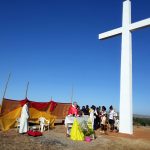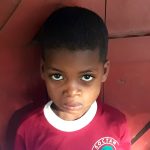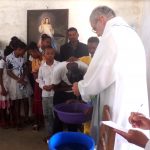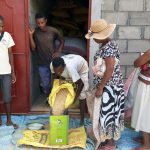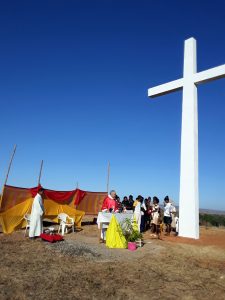
La croix à Tsarahasina
This year, Madagascar has moved in step with the whole world. The Covid-19 pandemic has united the world in its fight against a common enemy. We thought we were isolated on the main island, far from the extraordinary events in the rest of the world, but this virus brought us closer together. At the end of February, I was able to go to Mauritius to visit four MEP priests who work there. At the airport, calm reigned as already there were no more planes flying to Asia, only to India and Madagascar. We thought we were far from the virus. However, on March 21, we entered lockdown. No taxis for the capital, Tana, only trucks could drive. Fortunately taxis still operated in the region spared by the virus.
The President of the Republic praised a plant of Chinese origin as protection against the virus. This plant, Artemisia annua , is cultivated in Madagascar to produce synthetic drugs against malaria. We grow it in Tsarahasina to combat swamp fever, which still kills a lot of people. It is effective, we take it as a herbal tea. I do not know its effect on Covid-19, but it has a beneficial effect in strengthening the body’s immune system.
I don’t know if it saved a lot of people. However, the president’s announcement was a great help in relaunching research into this plant, in order to eradicate malaria which kills many more than the virus in our region.
In Madagascar, there have been few official deaths and infections. The population is very young and perhaps for that reason has stronger immunity. The Pasteur Institute has just published an article in which it estimates that 40% of the Malagasy population has been in contact with Covid-19. In the region where I am, in the north of the island, as in all of Madagascar, life returned to normal in August. In the capital, everyone wears masks. Currently, it seems that the virus is spreading in the universities of Diego and Mahajanga. We will see what happens next.
I have been able to move around the island normally since early December in order to visit the MEP priests in Madagascar. The MEP teaching volunteers returned to France at the end of March. Of the six who remained, only two are still working with me in construction. We hope that a few more will be able to join us in the first quarter of 2021.
Since March 21, very few planes have landed in or left Madagascar. The country is isolated. Despite this, life continues in the bush and the arrival of regular rains in the Port-Bergé region has encouraged farmers. We are in the midst of planting trees in Tsarahasina, before we then transplant the rice.
There were severe floods in the plain in Tsarahasina, at the end of January 2020. The rice was damaged and the corn was ravaged by the corn borer caterpillar. At the beginning of March, we had to distribute more than forty tons of rice in the surrounding villages. It was a difficult time for everyone. In June, we stored more than ten tons of rice that we have just distributed as seed.
A diocese under construction
Despite the lockdown, I was able to resume travelling on foot from June to visit Christian communities in the bush. The construction sites were never closed, the builders needed to work for a living. Volunteers Lucile and Emmanuel continued their work with enthusiasm. Within the Tsarahasina mission, in 2020, we were able to build three classrooms for a new school in Antsambalahy, two cinder block churches with tin roofs in Ambodimadiro and Bemakambana, as well as a mud wall church with a sheet metal roof in Entremahely. Each site is an adventure, transporting materials and getting people to carry the sand and stones with their carts. We still have four churches to build in 2021. We had few baptisms in the parish this year and no weddings were celebrated. This is partly due to the lockdown. We hope that the coming months will allow us to do more work in the villages.
In the diocese too, the works continued. In Pont-Sofia, Lucile, a volunteer architect, prepared the plans and supervised the construction of a 24 x 14 metre church. This was a great experience for her! In Ampasimatera, Emmanuel supervised the construction of a school with twelve classrooms on three levels. A beautiful site with many unexpected events, but altogether a great technical and human achievement! He also monitored several projects in Port-Bergé that were in the final stages and, since December, the construction of three classrooms on one floor in the parish of the Sacred Heart in Port-Bergé. Working with a company, we completed the construction of a house for nuns in Tsimijaly (Mampikony) and another in Mandritsara, in the parish of the Holy Family. For 2021, we still have several big projects, including two houses for nuns in Ampasimatera and Ankiririky. And we will finally start work on the health centre in Port-Bergé.
This year, the diocese welcomed priests from the Society of the Divine Word, a society of missionary priests from Germany. A Polish priest and an Indonesian priest came to work in the diocese. They have been working in Madagascar for several years. They are going to open a third parish in Mandritsara. Three Madagascan Trinitarian priests will also join us to open a parish in Mampikony.
Despite the lockdown, the ordination of Daniel, a young man from Mandritsara, went ahead. There are regular ordinations in our diocese, but still too few. Despite all the efforts of priests, nuns and catechists, still only 2% of the population in our diocese are Catholic. The opening of new missions and the arrival of religious congregations will enable the Church to be closer to the people to witness to the love of Christ the Saviour. During the lockdown, some people were able to discover a new passion. For us priests, the passion that has fired us ever since we made our commitment has been to make everyone discover the love of Christ for all men. This passion gives us life and guides us. What a joy it is, both human and spiritual, to be able to live such a passion which takes over all of our being! How to transmit this passion to the young? There are no ready-made solutions, everyone must have a personal encounter with the Risen Christ. It is Christ who must act in the hearts of everyone. And we have to give Him space in our life. We must leave room for Providence. Perhaps in this time of lockdown some people will arrive at a new perspective on the meaning of life. This virus has spread at lightning speed around the world, even to very remote places. We can only dream of the Gospel spreading at the same speed and being talked about as much
Fruits of hope
For several years now, I have been helping parents to look after children with cleft lips and club feet. This activity makes it possible to transform projects that are small in themselves but bear fruits of hope. Five years ago, I started a small sheep farm in Tsarahasina. There were just three sheep in the beginning, now there are over sixty. We are starting to give two ewes to people who want to start breeding sheep and in two years they will give us two ewes back. In this way, we are working to extend this small-scale breeding in the region.
The agricultural college that I manage in Port-Bergé is developing slowly and is also bearing fruit. Former students are happy to come back to the college and give updates. For some of them, their projects are taking shape. They are managing to improve their lives.
The population is growing rapidly; it is a very young population, but society is still unable to anticipate and organize this growth. The Church is trying to improve people’s lives, without being able to anticipate the changes in society that we are experiencing. Everyone is affected by the urgency, but there is a lack of thinkers and places of reflection to develop a longer term vision. This may be where our next challenges lie, to help the mission in a context that is changing very quickly.
May this New Year, which is starting in a somewhat unusual global atmosphere, help you return to what is essential in your life and to free yourself from unnecessary struggle! Christ is waiting for us to be witnesses of his love, wherever we are in our daily lives. Let us be his witnesses in our commitments and in our work!
Fr Bertrand de Bourran, MEP
- La croix à Tsarahasina
- L’enfant après l’opération
- Enfant soigné pour des pieds bots
- Baptêmes en brousse
- Distribution de semences de riz à Tsarahasina
